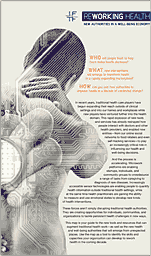Future Now
The IFTF Blog
Reworking Health: Calibrating Pain
Quantifying subjective experiences legitimizes alternative therapies
The doctor’s office pain chart has long been a source of frustration for distressed people trying to quantify a subjective experience. It’s our best shot at shorthand for communicating a personal and complex thing, but the increasingly furrowed brows of a cartoon face leave much to be desired. So, what if ubiquitous measurement and analytics could objectively and accurately measure personal pain levels?
Over 100 million Americans suffer from chronic pain. It’s the number one reason people seek medical care. Health economists from Johns Hopkins reported the annual cost of chronic pain is as high as $635 billion, more than the yearly costs for cancer and heart disease combined. Today, pain is a subjective experience, and you are your own ultimate authority.
Recent efforts out of Stanford School of Medicine are using fMRI scans to objectively measure pain. For the experiment, each participant was given a painful dose of heat and then fMRI scans identified activity across different brain regions. They then used a machine-learning algorithm to create a unique pain signature for each participant. The study claimed that the signature could predict pain intensity with over 94% accuracy. They also measured the difference between physical pain and social pain.
Social pain and physical pain typically activate the same regions of the brain. But, as we start to better understand how different groups of neurons code for different affective events, the specific pattern of activation can be differentiated for a more refined understanding. When someone presents with pain we could know whether to focus on a physical or emotional response.
At first glance, these types of new measurements are empowering – this seems like a breakthrough moment for pain management. But on the flip side, pain also includes a complex mix of emotion and memory. Imagine how much more frustrating a clinical encounter would be if the measurements weren’t calibrated to detect the very real pain you were experiencing.
It’s important to acknowledge this limitation of computation as a source of authority. As we learn more about the brain it can be tempting to think more mechanistically about ourselves. Let’s not risk assuming our brains work just like computers, if only we can figure out the code. We should also put our computational power to work looking for patterns and answers in the data outside of our brains.
At the Pain Medicine Care Complex at Children’s National Medical Center, Dr. Julia Finkel is using technical data from games to objectively identify and monitor children with chronic pain. The system uses a Microsoft Kinect to track 2 dozen points on a patient’s body—feeding data about her movements—angles, distance, speed, frequency into a database that converts it into graphics that the physical therapist can see in real time on her ipad. Clinicians will be able to objectively measure how a patient’s movements change over time and alternative therapies—like playing video games—gain legitimacy through hard numbers. Already, these tools are spilling out of the clinic and into our homes. 3D cameras and sensors basically put a personal physical therapist in your living room.
With more diverse and precise measurement we can build more accurate feedback loops. Alternative therapies become evidence-based and have easier paths toward becoming standards of care. If the U.S. Army can make acupuncture a commonplace treatment to reduce reliance on opioids, imagine what other unexpected and alternative therapies could abound in a decade.
In our 2013 Health Horizons research, Reworking Health, we examined four emerging sources of authority—computation, narratives, networks, and ambience—that will fundamentally transform who we trust and what interventions will be available in a rapidly expanding health and well-being marketplace.
This series of blog posts dives into the map's forecasts to reveal new opportunities and help you imagine what skills and capacities you or your organization can develop to rework health in the coming decade:
About IFTF's Health Horizons Program
- Contact Dawn Alva at [email protected] or 650-233-9585




